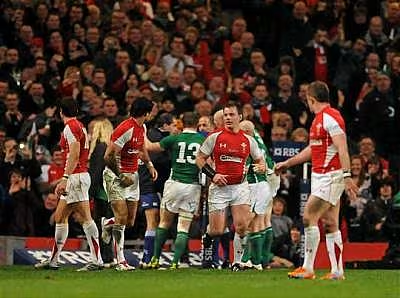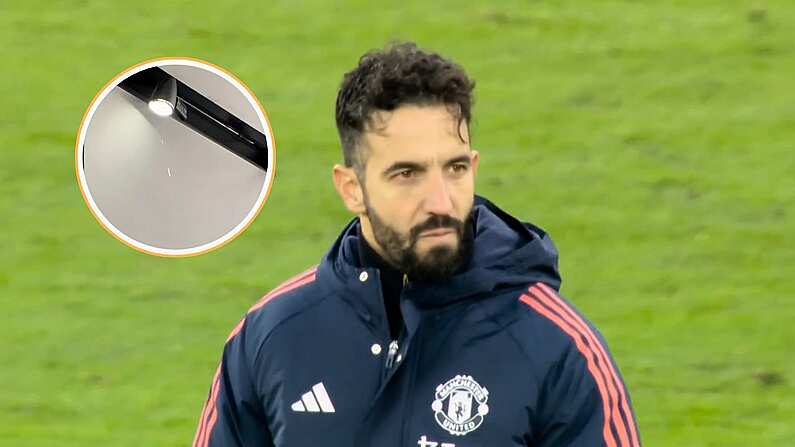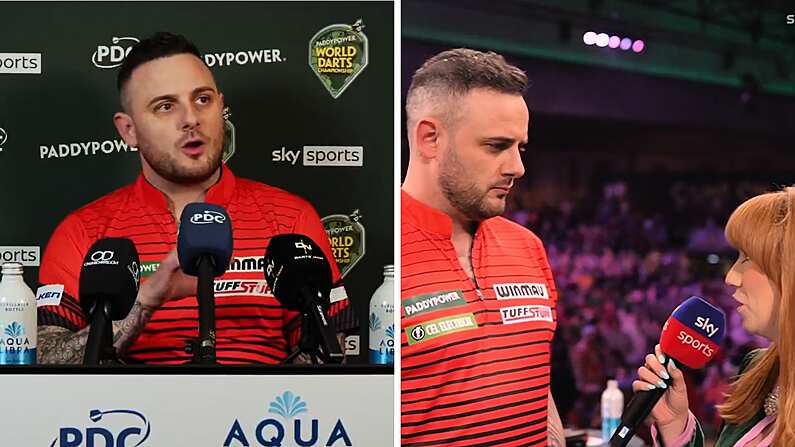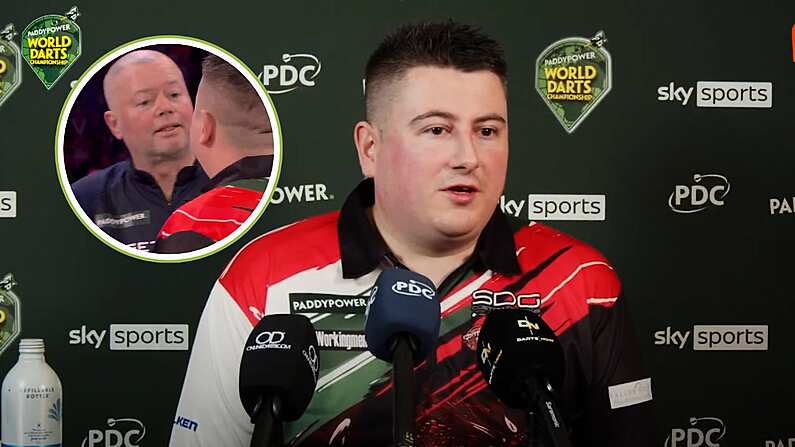This evening's Scannal documentary on RTE 1 looks at the Leinster Final debacle, when Joe Sheridan's 'perfect goal' denied Louth their first provincial title in 50 years. Here are six of the greatest injustices in the history of Irish sport.
6. 2009, Ireland v Georgia
Check your privilege, Ireland. Roy Keane insisted we do this while whining about the Henry business. He highlighted the penalty given against the doughty Georgians in the 2010 World Cup qualifier in Lansdowne Road. Ireland trailed the game for just over 70 minutes when the ball squirted out of the challenge, ricocheted into the air, and glanced off a players arm
It barely occurred to the Irish players to appeal for a penalty but they didn't protest when the referee kindly decided to give them one. The Georgians understandably went nuts, while the Irish tried their hardest to look impassive and detached about the whole thing. Keane slotted the penalty and bagged the winner three minutes later.
5. 2011, Wales v Ireland
Up there in the Martin Sludden realms of ridiculousness, touch judge Peter Allan and referee Jonathan Kaplan managed to allow this Mike Phillips try, despite the fact that it could have called illegal on FOUR separate grounds.
Matthew Rees took the quick line-out with a different ball (illegal) having been handed it by a ballboy standing about a yard away from the touch judge (illegal). It was taken from the wrong position, as it was not in line with where Sexton had booted it out on the full (illegal), and Rees had his foot over the line when he flung the pass at Phillips (illegal)
Had any one of these infringements been spotted the try would have had to be chalked off. They missed all of them.
4. 1989, Tony Keady affair
1989 is a sorrowful year in the history of Galway hurling. They were chasing three-in-a-row and had just overcome their great nemesis Tipperary yet again in that year's League final.
1988 hurler of the year, Tony Keady made the fateful decision to travel to America that summer. This was possible for Galway hurlers who didn't have to worry about championship hurling until August. Galway wing back Gerry McInerney, he of the long hair, the moustache and the white boots, lived over there pretty much full-time in the 80s, only returning home to play two championship matches in August and September.
While there, Keady decided to tog out for Laois in a tournament against Tipp. It being a relatively lawless environment, Keady believed there was no problem with this. Numerous players had done similar things down the years.
However, the GAA inexplicably decided to clamp down on Keady and banned him for two matches, effectively barring him from the championship. At the highly publicised appeal just a week out from the All-Ireland semi-final, the proposal to have Keady's ban overturned was defeated narrowly. Keady slunk away from the ground, looking sheepish and wounded.
Tipperary beat Galway 1-17 to 2-11 in a very controversial All-Ireland semi-final, where Galway had two players sent off by referee John Denton and John Leahy was allowed stay on after pulling across Pete Finnerty. It subsequently emerged that Tipp's corner back Paul Delaney had also played illegally in America but had played in the semi-final.
Tipp got blamed by conspiracy theorists in Galway for bringing about Keady's suspension. However Tipperary voted in favour of overturning Keady's ban at his appeal.
D'you want to know the names of four counties who did vote against Keady's appeal?
Mayo, Leitrim, Roscommon and Sligo.
3. 1981, Belgium v Ireland
Ireland were drawn in an astonishingly tough qualifying group for the 1982 World Cup, facing off against Belgium, Holland and France in the tussle for two World Cup spots.
However, with Liam Brady, Frank Stapleton and Mark Lawrenson all at their peak, Ireland rose to the challenge magnificently, beating the Dutch and the French in Lansdowne Road, and securing a 2-2 draw in Holland.
They lost controversially in Paris, with Kevin adjudged to handled the ball in the box when he clearly headed it clear (irony). That was as nothing compared to what happened in Belgium.
First off, Frank Stapleton had a goal wrongly ruled out for offside, after he turned in a Liam Brady cross. Stapleton
In the final minute, with Ireland holding out, Eric Gerets threw himself to the ground just outside the box in what has to rank as one of the most ludicrously obvious dives ever seen on a football pitch. As a crossfield ball was launched towards the penalty area, Gerets sprinted toward the box and as he ran past the more or less stationery Steve Heighway, comically launched himself into the air like someone who had been fired out of a canon and flopped onto the ground with his arms stretched out in front of him on the edge of the box. In a decision so inexplicable as to be almost sinister, the referee Nazare adjudged that Heighway had fouled him and awarded the free.
The ball hit the crossbar, looped agonisingly into the air and Ceulemans headed home in the ensuing scramble. The goal eventually proved to be pivotal in Ireland not going to the World Cup.
Eoin Hand accused the referee of taking a bribe after the match. Years later, Belgian club Anderlecht, the winners of the 1984 UEFA Cup were banned after bribing the referee before the semi-final against Nottingham Forest.
Just before the 2002 World Cup, Paul Howard conducted an extraordinary interview with the Portuguese referee Raul Nazare for the Sunday Tribune. Nazare told Howard he had 'secretly hoped Ireland would win' and attempted to defend his decisions. On viewing the taped footage, he gave conflicting reasons for disallowing Stapleton's goal and said that Gerets touched.
Yes he is clowning, there is no doubt, but there is some physical contact with this player, Steve Heighway.
2. 2009, France v Ireland
Hard to beat. Irish people overdosed on complaining about it in the days following. It is now fashionable to insist that Henry was just opportunist and Paul McShane should have cleared it.
1. 2010, Meath v Louth
It will take a psychologist of greater powers than works here to establish just what was going through Martin Sludden's head when he decided that Joe Sheridan's lunge for the line in the 2010 Leinster Final constituted a legitimate goal.
Sheridan himself decided on a multi-pronged strategy when defending what had transpired on RTE afterwards, confidently insisting that it was a 'perfect goal' but then falling back and announcing 'it was a penalty if it wasn't a goal.'
The grief-stricken Louth woman captured afterwards evoked great sympathy in the nation at large, though this was squandered by her county-men who proceeded to jostle a frightened looking Sludden on his harrowing march towards the tunnel.












